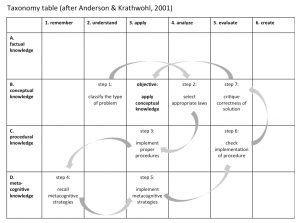
Finding the right instructional method for different kinds of knowledge
When reading Anderson & Krathwohl’s 2001 revised taxonomy of educational objectives, I really liked how they made clear that different kinds of knowledge require different instructional approaches as well as different kinds of assessment.
For example, if you were to teach remembering factual knowledge, you would probably spend quite some time reminding students of the details you want them to remember. You would probably also point out strategies that could help, like rehearsing facts, or techniques, like mnemonics.
To assess whether students remember factual knowledge, you might want to have them match lists of technical terms with definitions of those terms, drawings of technical parts with the names of those parts, or physical constants with their units or values.
If, on the other hand, you were to teach analyzing conceptual knowledge, good strategies would be to focus on categories and classifications so students get an idea of where a concept is located in the bigger landscape of the field they are currently studying. To better understand categories and classes, discussing examples as well as non-examples is helpful. Also, emphasizing the differences between categories helps.
To assess analysis of conceptual knowledge, you might want to give a new example of a member of a category you discussed in class. Then you might ask students which category the example belongs to, how they know which category it belongs to, or how you could modify the example so it matches a different category.
While you probably do a lot of this intuitively already, I find it helpful to think about the different categories in order to systematically find good instructional strategies. And it is especially helpful to remember that even though you might be able to classify your learning objective in one category, teaching that activity might require activities that belong to different categories. Especially, you might want to use complex processes to facilitate learning of simpler objectives.
For example when applying conceptual knowledge, you might want to give your students the chance to first classify the type of problem they are working on. Then, they should select the appropriate laws that describe the problem. Then, they need to implement the proper procedures to solve the problem. In order to be able to do that, they might need to recall meta-cognitive strategies, and then implement those. They should also check the implementation of the procedure before finally critiquing the correctness of their solution. And as you might have noticed, those steps are all over the place both along the knowledge dimension as well as along the cognitive dimension (see below).
Now thinking of assessment. Do you really only want to test whether students are able to come to the correct solution when you ask them to apply conceptual knowledge, or would you rather see how well they do along the way and test all the different categories? This is, of course, up to you, and either choice has its advantages. But it is definitely worth thinking about it.
The book gives a lot of examples of assessment for all the six categories along the cognitive process dimension, broken down to match all the sub-categories along that dimension. It’s really worth looking into that, if only for inspiration!
—
Bloom, B., Englehart, M. Furst, E., Hill, W., & Krathwohl, D. (1956). Taxonomy of educational objectives: The classification of educational goals. Handbook I: Cognitive domain. New York, Toronto: Longmans, Green.
Anderson, L. & Krathwohl, D. (Eds) (2001). A taxonomy for learning, teaching and assessing. A revision of Bloom’s taxonomy of educational objectives. Pearson Education

Browsing the "you have a part to play" toolkit for higher education for sustainability (Meerkerk, de Mul & Broekhaus; 2024) - Adventures in Oceanography and Teaching says:
[…] questions for learning outcomes. They use Bloom’s taxonomy (or rather the revised version by Anderson & Krathwohl, that I used to work with a lot 10 years ago) to write learning outcomes as a verb (the action […]